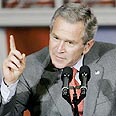
Bush: Iran attack reports 'wild speculation'
While White House is still warning Iran about its uranium enrichment, which Washington and its allies believe hides a nuclear weapons program, administration goes out of its way to play down reports of planning for military strikes
The United States wants to settle the Iran nuclear crisis through diplomacy, President George W. Bush said on Monday, describing reports of plans to attack the Islamic Republic as "wild speculation."
While the White House is still warning Iran about its uranium enrichment, which Washington and its allies believe hides a nuclear weapons program, the administration went out of its way Monday to play down reports of planning for military strikes.
"The doctrine of prevention is to work together to prevent the Iranians from having a nuclear weapon," Bush said at Johns Hopkins University in Washington.
"I know we hear in Washington 'prevention means force'," he added.
"In this case, it means diplomacy, by the way. I read the articles in the newspapers this weekend - it was wild speculation," he said.
White House spokesman Scott McClellan said however that Bush is not taking the military option off the table.
The UN Security Council set a 30 day deadline on March 29 for Iran to suspend uranium enrichment activities, which Washington and its allies believes hides a nuclear weapons program
.
Iran's President Mahmoud Ahmadinejad vowed again Monday not to give in to the Security Council demand and many diplomats say the United Nations may be forced to take action.
The United States has let Britain, France and Germany take the lead in international negotiations with Tehran, which insists that its nuclear programme is peaceful.
Bush said that the international community is "making pretty good progress" despite opposition from China and Russia to talk of sanctions against Iran.
The U.S. leader put Iran with Iraq and North Korea in an "axis of evil" in a speech in 2003. "I meant it," he declared.
"I saw there is a problem. And now many others have come to the conclusion that the Iranians should not have a nuclear weapon."
'Iran is not Iraq'
The Washington Post newspaper and New Yorker magazine reported over the weekend about plans for possible military strikes.
The New Yorker said the US administration plans a bombing campaign against Iran, including the use of bunker-buster nuclear bombs to destroy the suspected main Iranian nuclear weapons facility.
The Washington Post said Bush is studying options for military strikes as part of a broader strategy of coercive diplomacy to pressure Iran over its nuclear program.
Citing unnamed US officials and independent analysts, the newspaper said no attack appeared likely in the short term, but officials were using the threat to convince Iran that Washington is serious.
Military experts said that any military strike would be full of risk. European leaders have also spoken out against any immediate military threat in the dispute.
McClellan told reporters: "We are pursuing a diplomatic solution by working with the international community.
"Some of the media reports I've seen, which are based on anonymous outside advisors and former officials, appear to me to be based on people that do not know the administration's thinking.
"I think it is a lot of wild speculation."
He said reports and comments "based on normal military contingency planning are misinformed or not knowledgeable about the administration's thinking."
"We've said multiple times that Iran is not Iraq."
But McClellan repeated the administration's warning to Iran, saying that the nuclear programme is of "serious and growing concern."
He said "no president takes options off the table but our focus is on working with the international community to find a diplomatic solution."










